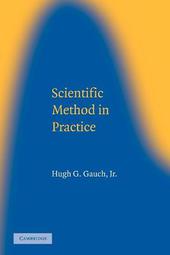
|
Scientific Method in Practice
Paperback / softback
Main Details
| Title |
Scientific Method in Practice
|
| Authors and Contributors |
By (author) Hugh G. Gauch Jr
|
| Physical Properties |
| Format:Paperback / softback | | Pages:456 | | Dimensions(mm): Height 229,Width 154 |
|
| Category/Genre | Philosophy of science
Scientific equipment, experiments and techniques
Physics
Chemistry |
|---|
| ISBN/Barcode |
9780521017084
|
| Classifications | Dewey:502.8 |
|---|
| Audience | | Professional & Vocational | |
|---|
| Illustrations |
7 Tables, unspecified; 15 Halftones, unspecified; 50 Line drawings, unspecified
|
|
Publishing Details |
| Publisher |
Cambridge University Press
|
| Imprint |
Cambridge University Press
|
| Publication Date |
12 December 2002 |
| Publication Country |
United Kingdom
|
Description
As the gateway to scientific thinking, an understanding of the scientific method is essential for success and productivity in science. This book is the first synthesis of the practice and the philosophy of the scientific method. It will enable scientists to be better scientists by offering them a deeper understanding of the underpinnings of the scientific method, thereby leading to more productive research and experimentation. It will also give scientists a more accurate perspective on the rationality of the scientific approach and its role in society. Beginning with a discussion of today's 'science wars' and science's presuppositions, the book then explores deductive and inductive logic, probability, statistics, and parsimony, and concludes with an examination of science's powers and limits, and a look at science education. Topics relevant to a variety of disciplines are treated, and clarifying figures, case studies, and chapter summaries enhance the pedagogy. This adeptly executed, comprehensive, yet pragmatic work yields a new synergy suitable for scientists and instructors, and graduate students and advanced undergraduates.
Reviews'In encouraging scientists to examine the basic beliefs and attitudes they share, Gauch provides an enriching journey into a humanities-rich version of science. And because it is a book written by a scientist for scientists, its practical use improves productivity while enriching the experience of discovery.' Marye Anne Fox, Chancellor of the University of California, former President of Sigma Xi (2001 - 2002), and Chair of the National Research Council Committee on Undergraduate Science Education 'Written by a scientist for scientists, this is an impressive and comprehensive treatment of the principles of scientific method. Hugh Gauch provides an important, and well-informed, contribution to our contemporary understanding of the practice of science.' Roger Trigg, Professor of Philosophy at the University of Warwick and Chair of the British Philosophical Association 'Hugh Gauch's discussion of the science wars and the impact this has had on science education is significant and important. Extensive international studies reflect the regrettable consequences of such philosophical diversions. This book helps one understand the issues.' William H. Schmidt, University Distinguished Professor of Education at Michigan State University and National Research Coordinator for the U.S. participation in the Third International Mathematics and Science Study (TIMSS) 'Gauch's claim that a deeper appreciation of the philosophical and theoretical principles undergirding the scientific method would improve the focus, effectiveness and productivity of research scientists is fundamentally sound. Using examples drawn from many fields in science and technology, including pharmacology and clinical medicine, he ably illustrates the relevance and practical benefits of his ideas. This book has much to offer students, educators and professional scientists alike.' Bartholomew J. Votta, Senior Investigator, Department of Musculoskel et. al. Diseases, GlaxoSmithKline Pharmaceuticals '... a resource that should improve the perspective and productivity of almost any student, educator or professional scientist who reads it.' Journal of Biological Education '... educationalists should find much of benefit in Gauch's elaboration of 'Scientific Method in Practice'. Science & Education
|